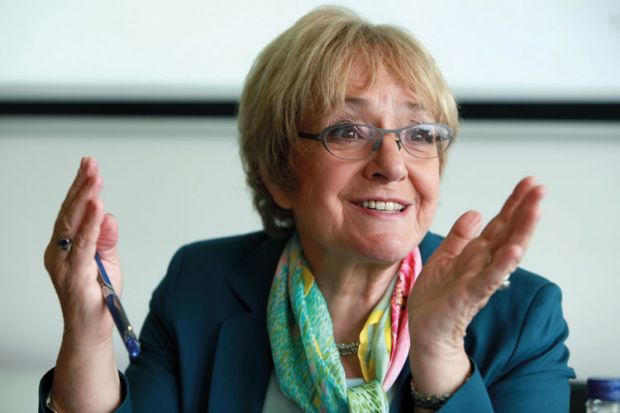Margaret Hodge has been the Member of Parliament for Barking since 1994 and has served in numerous government roles including universities minister and the first minister for children, a position created in 2003. Most recently, she chaired the Public Accounts Committee from 2010 to 2015. In June, she was appointed visiting professor at the Policy Institute at King’s College London.
Where you born?
Alexandria, in Egypt.
How has this shaped you?
I came to the UK at the age of four as my parents, who were European Jewish refugees, decided to leave Egypt because life had started to be uncomfortable for Jews there. My early experiences and memories as an immigrant child had a profound effect on my values and beliefs. For instance, I always felt an outsider, so even though others may now regard me as a privileged member of the British Establishment, I have never seen myself as part of the Establishment. My commitment to fighting inequality and striving in all I do to equalise life chances also comes from my immigrant background.
Your work at King’s will help to inform your forthcoming book on the PAC. What was the most shocking revelation you discovered during your tenure as chair?
Impossible to choose! I think the early inquiry into defence procurement was pretty mind-boggling. We uncovered £8 billion of wasted taxpayers’ money in one two-hour session. The continuing saga of the [UK's] aircraft carriers under both the Labour and the coalition governments is one of totally unacceptable waste. Our work on tax avoidance also uncovered some shocking revelations.
On the PAC, you were very critical of the government’s handling of private providers in higher education. What is your view on their proliferation the UK?
What incensed me with the expansion of private institutions was the failure of the department and of ministers to put a proper regulatory framework in place so that taxpayers were not ripped off by bogus students claiming for bogus courses. The lack of proper regulations in the name of minimising state bureaucracy simply led to hundreds of millions of pounds being misused. That outcome is unforgivable.
What do you make of the fresh ministerial team at the Department for Business, Innovation and Skills?
Jo Johnson [the minister for universities and science] served on the Public Accounts Committee when he first became an MP. I found him to be very bright, thoughtful and collegiate, with a strong lateral brain. The jury is out on whether he can use his talents to secure proper value on both student loans and private colleges. However, taking student grants away from those from the poorest backgrounds is not the best start from somebody who I thought was committed to increasing the number of students from less well-off backgrounds in our universities.
At King’s you will be academic colleagues with David Willetts, the Conservative former universities minister. Do you envisage cross-party scholarly collaboration?
I will enjoy working with David Willetts. I am only sorry that I arrived too late to take part in his first report and event on student funding, which was launched through the Policy Institute. We might well have disagreed, but that debate would have been stimulating and important.
You were universities minister as Labour sought to introduce variable tuition fees for the first time. Looking at how the system has developed, are you satisfied with your actions and beliefs when you were in charge?
We all wish that we had gone for a graduate tax, which would have been the fairest and most sustainable policy. However, it was unaffordable then and would be even less affordable today. The upfront costs were just too high and the payback to the Exchequer took just too long. When I was universities minister, we knew that the previous system of funding was unsustainable as numbers expanded. Also, I wanted to equalise life chances. That involved substantial investment in the early years so that the achievement gap, which is already very marked by the age of 20 months, is mitigated. So I would always prioritise spending on children in their early years over spending on university education, where the greatest benefit still goes to those from the wealthiest backgrounds.
If you were a prospective university student now facing £9,000 a year fees, would you go again or go straight into work?
I would [go again]. The opportunities that have opened for me from my education have been immense and hugely rewarding. Graduates are more likely to get better, more interesting jobs and are still likely to earn more over their working lives, although I know the earnings gap is closing.
As a child, what did you want to do when you grew up?
I wanted to act. I sort of got there, because politics is full of failed actors!
What kind of undergraduate were you?
I had a wonderful time, but I was a terrible student – I still have nightmares about my failure to work.
What’s your most memorable moment at university?
Playing the mother in A Taste of Honey for the London School of Economics Drama Society.
Tell us about someone you admire.
The greatest influences on my thinking are feminist writers such as Simone de Beauvoir and Doris Lessing (compulsory reading when I was young). Nelson Mandela will always be my absolute hero.
POSTSCRIPT:
Print headline: HE & me
Register to continue
Why register?
- Registration is free and only takes a moment
- Once registered, you can read 3 articles a month
- Sign up for our newsletter
Subscribe
Or subscribe for unlimited access to:
- Unlimited access to news, views, insights & reviews
- Digital editions
- Digital access to THE’s university and college rankings analysis
Already registered or a current subscriber? Login




